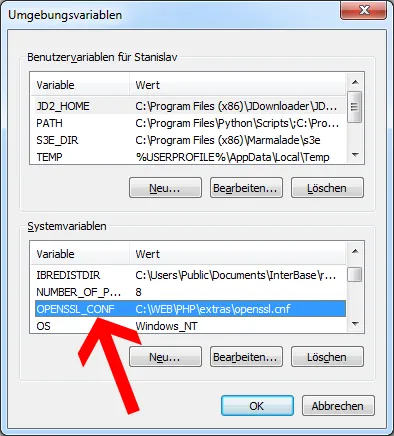问题:在我的Windows环境中,OpenSSL无法正常工作。OpenSSL一直报告0x02001003、0x2006D080和0x0E064002错误。
环境:
Windows NT x 6.1 build 7601 (Windows 7 Business Edition Service Pack 1) i586
Apache/2.4.4 (Win32)
PHP/5.4.13 x86
PHP Directory: E:\wamp\php\
Virtual Host Directory: E:\Projects\1\public_html
我尝试过的:
- 安装说明 http://www.php.net/manual/en/openssl.installation.php
- PHP.ini
extension=php_openssl.dll - Openssl.cnf
E:\wamp\php\extras\openssl.cnf - %PATH%
E:\wamp\php - 重新启动电脑
- phpinfo:
----OpenSSL支持已启用
----OpenSSL库版本 OpenSSL 1.0.1e 11 Feb 2013
----OpenSSL头文件版本 OpenSSL 0.9.8y 5 Feb 2013 - 在
configargs中指定和不指定config - 在apache配置中指定和不指定
<Directory E:\wamp\php\extras> - 将
openssl.cnf复制到虚拟主机public_html,指向它并仍然得到相同的错误 - 错误日志中没有记录任何内容
- 研究:我花了最近两天时间研究这个问题,很惊讶竟然没有更多的信息,所以我在这里发布。似乎是OpenSSL配置或apache/php未正确读取配置的问题。
代码:
$privateKey = openssl_pkey_new();
while($message = openssl_error_string()){
echo $message.'<br />'.PHP_EOL;
}
结果:
error:02001003:system library:fopen:No such process
error:2006D080:BIO routines:BIO_new_file:no such file
error:0E064002:configuration file routines:CONF_load:system lib
error:02001003:system library:fopen:No such process
error:2006D080:BIO routines:BIO_new_file:no such file
error:0E064002:configuration file routines:CONF_load:system lib
手动安装 OpenSSL:
E:\wamp\apache\bin>openssl.exe pkey
WARNING: can't open config file: c:/openssl-1.0.1e/ssl/openssl.cnf
E:\wamp\apache\bin>set OPENSSL_CONF="E:\wamp\php\extras\openssl.cnf"
E:\wamp\apache\bin>openssl.exe pkey
3484:error:0200107B:system library:fopen:Unknown error:.\crypto\bio\bss_file.c:169:fopen('"E:\wamp\php\extras\openssl.cnf"','rb')
3484:error:2006D002:BIO routines:BIO_new_file:system lib:.\crypto\bio\bss_file.c:174:
3484:error:0E078002:configuration file routines:DEF_LOAD:system lib:.\crypto\conf\conf_def.c:199:
编辑:
- 感谢@Gordon,我现在可以使用
openssl_error_string查看open_ssl错误。 - 彻底卸载EasyPHP。手动安装稳定版本的PHP / Apache。相同的结果!绝对是我在Windows上实现openssl时做错了什么。
- OpenSSL手动部分...其他错误信息。
最后的想法:
我设置了一个Linux箱,我得到了相同的错误。经过一些试验,我发现即使它在openssl_pkey_new处抛出错误,它最终也会创建我的测试p12文件。长话短说,这些错误是误导的,它更多地涉及您如何使用openssl函数,而不是服务器端配置。
最终代码:
// Create the keypair
$res=openssl_pkey_new();
// Get private key
openssl_pkey_export($res, $privkey);
// Get public key
$pubkey=openssl_pkey_get_details($res);
$pubkey=$pubkey["key"];
// Actual file
$Private_Key = null;
$Unsigned_Cert = openssl_csr_new($Info,$Private_Key,$Configs);
$Signed_Cert = openssl_csr_sign($Unsigned_Cert,null,$Private_Key,365,$Configs);
openssl_pkcs12_export_to_file($Signed_Cert,"test.p12",$Private_Key,"123456");
关闭。
一年后...
一年后,我又发现自己在做同样的事情。无论我在计算机或脚本执行期间设置了什么PATH变量,它都会出现文件找不到的错误。我通过在openssl_pkey_new中的config_args数组中传递config参数来解决了这个问题。下面是一个测试成功使用OpenSSL的函数:
/**
* Tests the ability to 1) create pub/priv key pair 2) extract pub/priv keys 3) encrypt plaintext using keys 4) decrypt using keys
*
* @return boolean|string False if fails, string if success
*/
function testOpenSSL($opensslConfigPath = NULL)
{
if ($opensslConfigPath == NULL)
{
$opensslConfigPath = "E:/Services/Apache/httpd-2.4.9-win32-VC11/conf/openssl.cnf";
}
$config = array(
"config" => $opensslConfigPath,
"digest_alg" => "sha512",
"private_key_bits" => 4096,
"private_key_type" => OPENSSL_KEYTYPE_RSA,
);
$res = openssl_pkey_new($config); // <-- CONFIG ARRAY
if (empty($res)) {return false;}
// Extract the private key from $res to $privKey
openssl_pkey_export($res, $privKey, NULL, $config); // <-- CONFIG ARRAY
// Extract the public key from $res to $pubKey
$pubKey = openssl_pkey_get_details($res);
if ($pubKey === FALSE){return false;}
$pubKey = $pubKey["key"];
$data = 'plaintext data goes here';
// Encrypt the data to $encrypted using the public key
$res = openssl_public_encrypt($data, $encrypted, $pubKey);
if ($res === FALSE){return false;}
// Decrypt the data using the private key and store the results in $decrypted
$res = openssl_private_decrypt($encrypted, $decrypted, $privKey);
if ($res === FALSE){return false;}
return $decrypted;
}
// Example usage:
$res = testOpenSSL();
if ($res === FALSE)
{
echo "<span style='background-color: red;'>Fail</span>";
} else {
echo "<span style='background-color: green;'>Pass: ".$res."</span>";
}

openssl.exe时,我看到它在./crypto上出现错误,但是我在apache\bin中没有看到./crypto文件夹,而这里是openssl.exe所在的位置....未知错误:.\crypto\bio\bss_file.c:169:fopen- Brock Hensley/usr/local/ssl,或者像Z:\OpenSSL这样的驱动器。甚至可能是一些 Cygwin 的路径,比如/c/windows/system。这些构建中有各种疯狂的配置硬编码进去了。使用 ProcMon 来确定错误的路径。 - jww